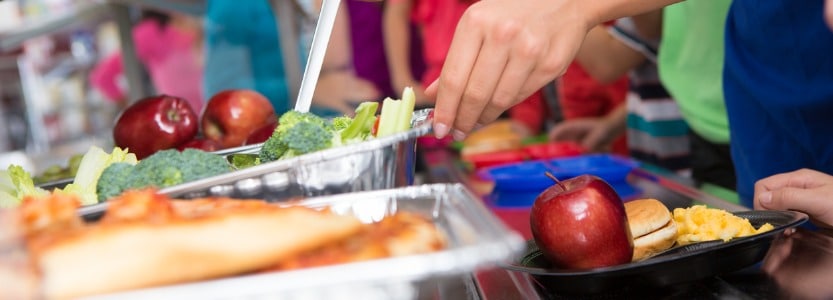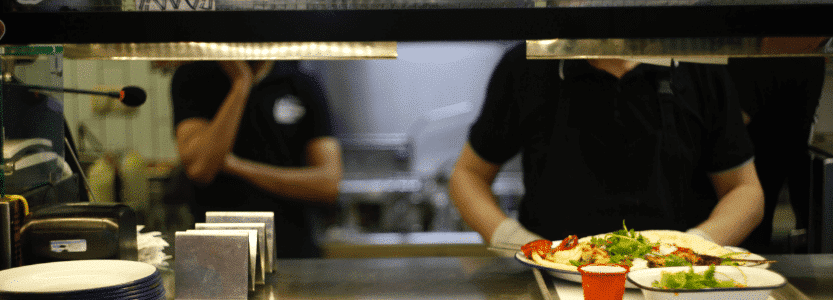School Meals Through The Years As We Celebrate NSMW14
Updated 19th July 2024 | 5 min read Published 2nd November 2020

This week, the UK education community is celebrating the 21st anniversary of the National School Meals Week (NSMW). Organised by the Local Authority Caterers Association (LACA), the NSMW promotes awareness of healthy eating and increase take up of school dinners in primary and secondary schools across the UK.
Between 3rd and 7th of November, schools and school caterers across the UK are busy with various activities including serving a special Bonfire meal, Roast Dinner Day on Wednesday, and free school lunch for all students.
The highlight of the event so far was the free meals cooked in a pop-up kitchen in front of the House of Commons. On Tuesday Peers, MP’s, tourists and the public had the chance to taste the food served in UK schools.
As part of the celebration, BioStore FasTrak looks at how British school dinners have evolved through the years.
1879 – The First School Dinner
Nine years after the introduction of the Elementary Education Act 1870 that made education compulsory for all children between 5 and 13 years old, local education authorities and school boards started providing school dinners.
In Manchester, destitute and undernourished children were given free school meals. In Bradford, school board members Fred Jowett and Margaret McMillan urged the government to pass a law that would require all education authorities to offer school meals. They reasoned that since the state made education compulsory, it was its responsibility to ensure that school children were properly fed.
Around this time, the School Board for London and other organisations such as the Salvation Army, also started offering free or cheap school dinners.
1906 – Education Act of 1906 (Provision of Meals)
Fred Jowett was elected as MP for Bradford. He used his first speech to launch a campaign for school meals. This led to the creation of Education (Provision of Meals) Act of 1906. The act allowed local authorities to offer school meals, but did not make it a requirement.
1921 – Education Act of 1921 (Free School Meals to Eligible Children)
The Education Act of 1921 set out the criteria for free school meals eligibility. However, a miners’ strike that year increased the cost of offering meals to around £1 million. The Board of Education tried to limit the cost to the central government to just £300,000 by setting up a rationing system. As a result, many undernourished children could not get any meals.
1940-1945 – World War II
During World War II, the school meals service expanded. In 1944, school meals and milk became a statutory duty. By February 1945, more than 1.6 million meals were being served daily. A third of the school population were having school dinners, with 14% receiving free meals and the rest paying 4 or 5 pennies to cover the cost of the ingredients.
1946-1951 – Free Milk
In August 1946, universal free milk was introduced in schools. During this period, the typical lunch for a child included meat, potatoes, a vegetable and a pudding. Strawberries and rhubarb were the most commonly eaten fruits, while fresh peas, lettuce and tomatoes were the most commonly eaten vegetables.
1953 – School Meals Price Increase
In 1953, the price of a school meal increased from 7 pence to 9 pence. This led to a decline in school meal uptake.
1957 – Principle Breach
The Treasury wanted to charge the full market price of a school meal, which was 1 shilling and 9 pence. However, Minister of Education Quintin Hogg only raised the price from 10 pence to 1 shilling. This broke the principle that the price of school dinner should only cover the cost of the ingredients.
1968 – Another Price Hike
The price of school dinner went up from 1 shilling to 1 shilling and 6 pence. Free milk for children in secondary school also ended.
1971 – No more milk
As Education Secretary in Edward Heath’s government, Margaret Thatcher stopped the provision of school milk.
1980 – School Meals Nutritional Standards Abolished
The 1980 Education Act abolished the minimum nutritional standards for school meals and removed LEAs’ statutory duty to offer a meals service. Their duty was limited to providing food to children from families on benefits.
1988 – Children Lost Right to Free School Meals
In 1988, the 1986 Social Security Act came into force. Only children whose parents received income support (formerly known as supplementary benefit) were eligible to receive free school dinners. Children of parents receiving family credit (formerly known as family income support) were no longer eligible.
Instead, they received money to make up for the loss of the free school meal. Thousands of children lost their right to free school meals.
In the same year, the Local Government Act (1988) also introduced Commercial Competitive Tendering. This required all LEAs to put school meals services out to tender and choose the most competitive catering on offer. Consequently, private companies took over many school kitchens.
1993 – National School Meals Week Launched
LACA ran the first National School Meals Week in the UK to promote uptake of school meals. This was supported by the House of Commons, which affirmed the importance of healthy school meals to the well-being and happiness of children in Britain.
2000 – School Meals Nutritional Standards Was Back
Twenty years after its abolition, the nutritional standards for school meals were reintroduced on 12 July 2000. It became compulsory in April 2001.
2003 – The Start of Cashless Catering
The first school online payment system, ParentPay was launched. It integrated with cashless catering systems, just as BioStore’s FasTrak system does.
2005 – School Meals Condemned
Unhealthy school dinners hit the headlines after celebrity chef, Jamie Oliver, criticised school dinners in his four-part documentary Jamie’s School Dinners.
In the same year, the Department of Health launched the Food in Schools Programme. The aim was to help schools across England implement a whole-school approach to healthy eating and drinking.
2012 – Reports Revealed Free School Meals Stigmatised Children
In 2012, a report published by The Children’s Society revealed that hundreds of thousands of children don’t take up their free school meal because of the stigma attached to it. The report made a strong case for cashless catering, which offered anonymity for children on free school meal benefits.
2014 – Launch of Universal Infant Free School Meals (UIFSM)
In September 2014, the Universal Infant Free School Meals was launched. Amid criticism, logistical challenges and budget shortfall, 98% of primary schools in England offered free hot meal choices to children in KS1.
Ready to get up to speed with school meal payments in your school?
We have the best system for your primary school, secondary school, or Multi Academy Trust. Check out our range of systems for school meal payments for more information.
Related news stories:








